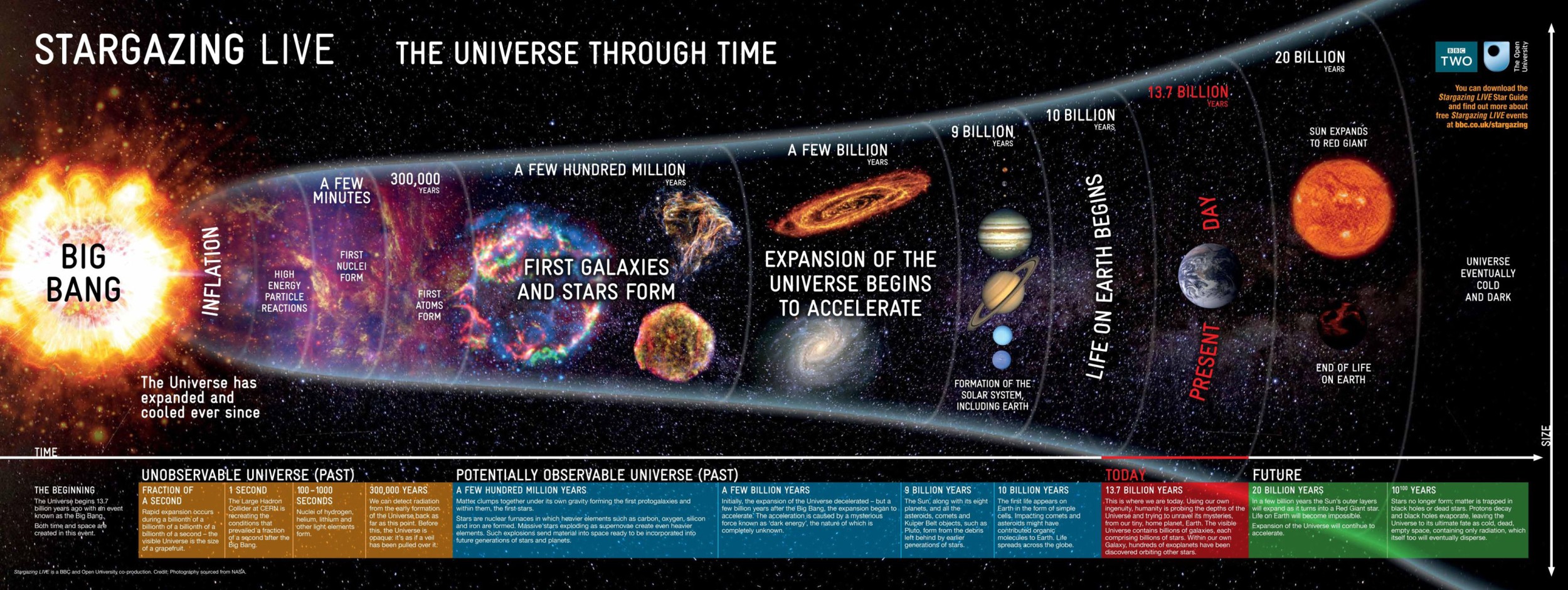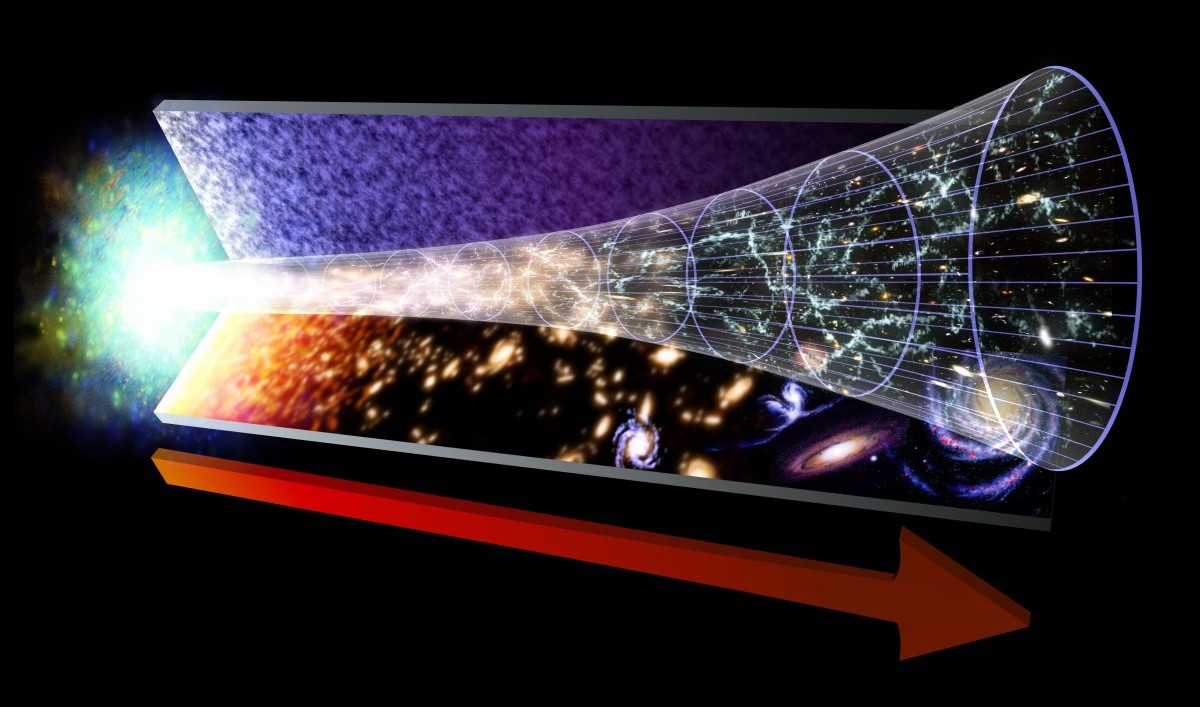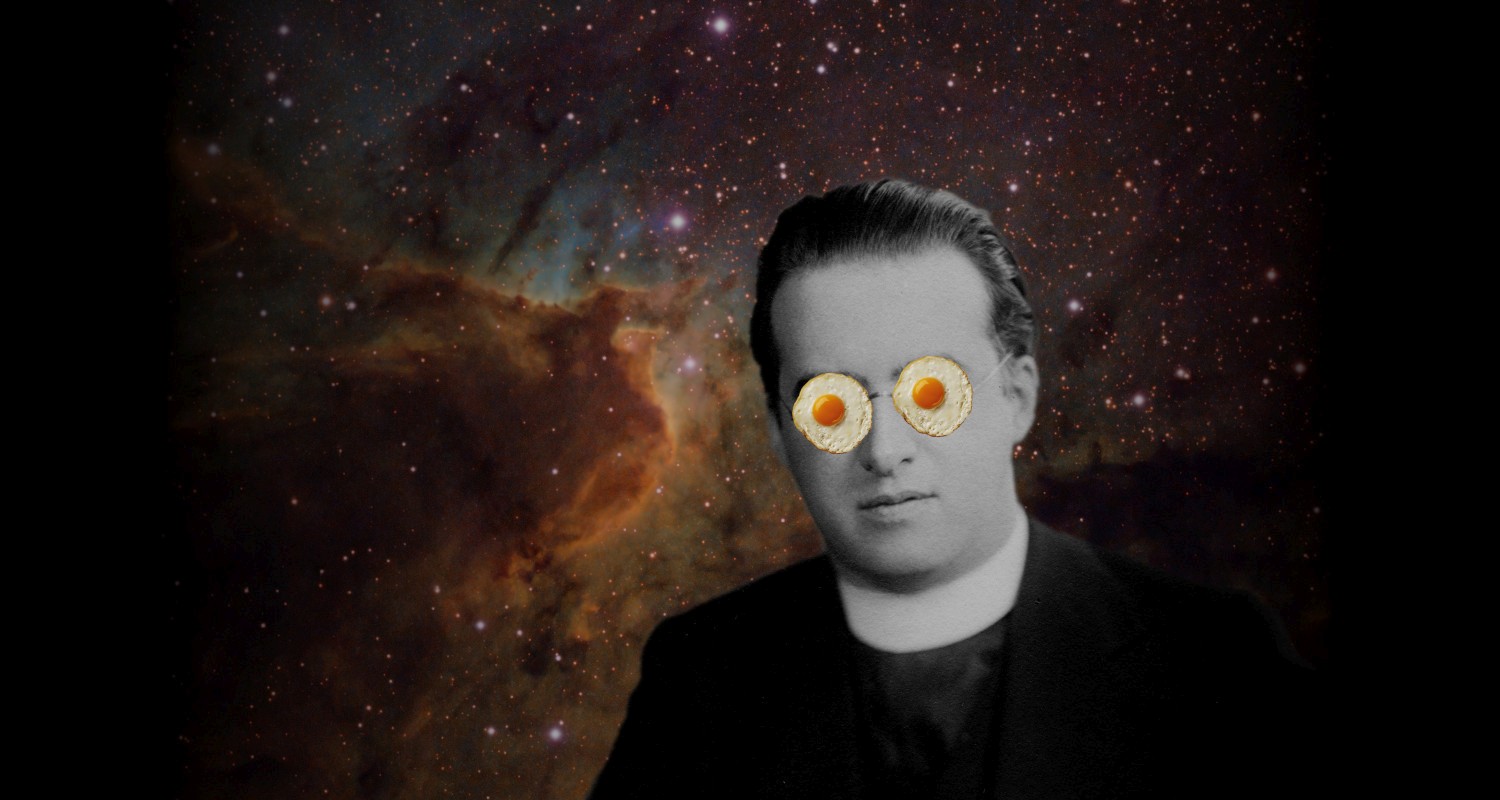Big Bang
The birth of the fine-tuned universe
Before the acceptance of the Big Bang theory it was believed that the universe and the earth had always existed, that it was without beginning. It is called the steady-state theory. This is odd because the universal laws of thermodynamics already dictated that the universe was evolving towards a state of more entropy with time, which of course indicated that towards the past there must have been a state of lower entropy, reaching a point where it must have had a beginning. In other words, the universe moved from a state of total order towards disorder, ultimately ending in heat death.
In 1929 the Hubble–Lemaître law was presented, which is the observation in physical cosmology that galaxies are moving away from Earth at speeds proportional to their distance.
In 1965 Cosmic microwave background was discovered which is microwave radiation that fills all space in the observable universe. This confirmed the expansion of the universe.
Extrapolating this cosmic expansion backwards in time using the known laws of physics, the models describe an increasingly concentrated cosmos preceded by a singularity, the beginning of everything.
These and other discoveries led to the current belief in the Big Bang theory, which is a physical theory that describes how the universe expanded from a primordial state of high density and temperature. This of course implied that the universe had a beginning, the so-called singularity.
Before the Big Bang theory evolutionists believed in the Steady State theory. This is odd because according to evolution life evolved from inferior to superior states indicating there must have been a beginning of life and ultimately of the universe itself. But the reason for their belief was that it gave them infinite time for their theory of very slow and gradual evolution. According to their philosophy naturalism they believed that the natural world was all there was. But of course it would be impossible to explain the beginning of the natural world itself by means of naturalism. Cause and effect is a basic tenet of science. Both the coming into existence of the universe and life are dilemmas for naturalism.
Science can never explain what happened exactly at the point of the creation of this universe, how it happened, and what was there before it. But we do know that, whatever happened, the result is this fine-tuned universe.
screenshot
Paul Davies:
If we extrapolate this prediction to its extreme, we reach a point when all distances have shrunk to zero. An intitial cosmological singularity therefore forms a past temporal extremity to the universe. We cannot continue physical reasoning, or even the concept of spacetime, through such an extremity. For this reason most cosmologists think of the initial singularity as the beginning of the universe. On this view the big bang represents the creation event; the creation not only of all the matter and energy in the universe, but also of spacetime itself.
The singularity defines the starting point of time and history. This is also where science has reached its absolute limit. It shows that the fine-tuned universe with all its specified complexity theoretically originated from nothing. Matter is incredibly, mind-bogglingly empty* and it is over 99.9% empty space*. Science is limited and nobody knows what kind of possibly even smaller particles will be found in the future. The visible world is made of the invisible. All matter consists of particles that are made up of even smaller particles and all of them are attracted to each other by means of invisible forces. Everything seems to resolve into energy and nothingness. But how can nothing turn into everything?
Cosmological argument
source
The cosmological argument...
1. Whatever begins to exist has a cause.
2. The Universe began to exist.
3. Therefore, the Universe has a cause.
William Lane Craig is an expert in the Kalam Cosmological Argument. Nothing comes from nothing, certainly not by itself. Cause and effect are universal. This is true logical reasoning. This universal reality raises an important question. What caused the fine-tuned universe to pop into existence from nothing?
The evolutionary worldview is limited strictly to the unprovable philosophy naturalism and excludes supernaturalism from its pallet of explanations beforehand without any evidence. But nothing comes from nothing. It is impossible to explain the coming into existence of the fine-tuned universe and the natural world by means of naturalism. Cause and effect, a principle of true science, has simply reached a dead end with naturalism. See also Entropy.
Most people will be somewhat familiar with the universal laws of entropy and the law of conservation of energy. If the total amount of energy always remains the same in a closed system, and the quality of energy naturally goes from a higher state to a lower state, then it logically follows that whatever caused the fine-tuned universe to come into existence, it must have been greater than that universe. It must have been incredibly powerful. And it wasn't a material cause.
What would be necessary for the creation of a fine-tuned universe fit for life with all its universal laws, mathematics and specified complexity? Mindless naturalistic processes are out of the question and the only viable alternative is an intelligent agent. Before the natural world there was the supernatural. The answer is plain and simple, but that answer is not what many people, who are opposed to anything hinting for God, would like to hear or believe. This denial of the obvious has led to some of the most deluded theories to date...
Atheist delusion
Stephen Hawking:
Spontaneous creation is the reason there is something rather than nothing, why the universe exists, why we exist, it is not necessary to invoke God to light the blue touch paper and set the universe going.
Before we understand science, it is natural to believe that God created the universe. But now science offers a more convincing explanation, what I meant by ‘we would know the mind of God’ is, we would know everything that God would know, if there were a God, which there isn’t. I’m an atheist.**
This philosophical idiocy of course had its effect on atheists and evolutionists around the world who eagerly parroted these words...
Our universe could have popped into existence 13.7 billion years ago without any divine help whatsoever, researchers say. ... In the very weird world of quantum mechanics, which describes action on a subatomic scale, random fluctuations can produce matter and energy out of nothingness. And this can lead to very big things indeed, researchers say.*
The reality is that science can say absolutely nothing about what caused the creation event of the universe. It is far beyond the limits of science. Hence the use of philosophical statements involving the denial of God. Of course the unprovable philosophy naturalism can never account for anything before the natural world simply because there was no natural world. Anybody who believes that something, let alone everything, can come from nothing by means of nothing is simply deluded.
Roger Penrose said the following about Stephen Hawking's book The Grand Design...
What is referred to as M-theory, isn't even a theory. It's a collection of ideas, hopes, aspirations. ... The book is a bit misleading in that respect.
John Lennox:
Nonsense remains nonsense even if spoken by very clever scientists.
Cosmic eggs
Lemaître first voiced his proposal that the universe had expanded from an initial point, which he called the "primeval atom" or "the Cosmic Egg, exploding at the moment of the creation", a theme he developed further in a report published in the journal "Nature" later that year.*
The Cosmic Egg is a mythological motif found in creation myths of many cultures and civilizations. In the Orphic cosmogony, the unaging Chronos produced Aether and Chaos and made in divine Aether a silvery egg, from which everything else appeared. See Arche and The Presocratic Philosophers. Chronos is the god of time which of course also plays a crucial role in the evolutionary belief system. The "golden womb" or "golden egg" is the source of the creation of the Universe or the manifested cosmos in Hindu philosophy. See Hiranyagarbha. Catholic Georges Lemaître proposed the Big Bang theory calling it aCosmic Egg exploding at the moment of the creation.* Catholicism is literally drenched in all kinds of mythical and pagan traditions and beliefs. Easter eggs and bunnies* for example.



